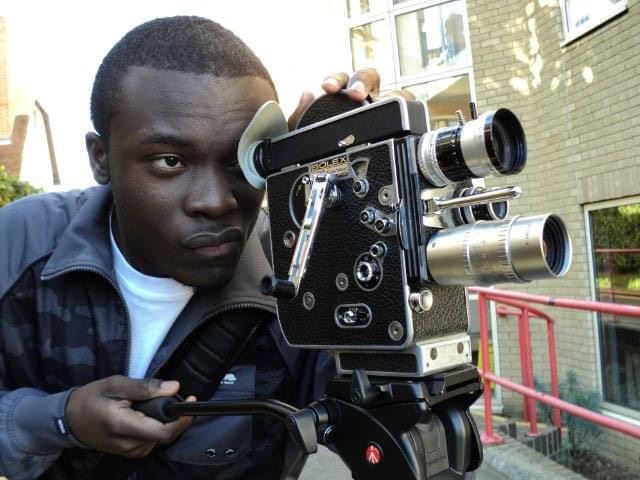Tell us a little about yourself...
I’m a South London born, raised and still residing writer-director of Nigerian descent. But if you really want to know about me, there are a lot of things I love that I wish I had more time for: puzzles, baking, playing squash, playing basketball. I’m a bit better at making time for cooking, reading and I support Manchester United for better and for worse. I also find the sound of football really therapeutic even if I’m not focusing on the match. I really like doing random surveys that I see online (like when people need someone to do a survey for their dissertation), strange, I know. My life is incomplete without my loved ones and I love creating memories with them.

What inspired you to become a filmmaker, and how has your heritage influenced your work?
Well I split the act of filmmaking into two broad categories: writing and directing.
I’ve always found joy in writing, my earliest memory of these joy was being in year 6 and feeling genuine excitement on the day of the part of the English SATs where you have to do a bit of creative writing, and I had already pre-planned that I would pick the option that involved writing a letter (a thread that’s followed throughout my life; I’m the friend who writes really long text messages). And so that’s been a theme my entire life: in school I loved the essay-based subjects. But a career in writing wasn’t anything I ever considered until a friend passed away when I was 19. At that point, I realised that spending the next two or three decades as I’d planned – well-paid, corporate career of some sort then chase dreams and have fun after – wasn’t actually guaranteed. And so I asked myself ‘what makes you happy?’ – as you can see, the answer has always been writing. And so I immediately made the decision to drop out of university and pursue a career in writing.
Directing was less a case of being inspired and more of an opportunity; I’d won Soho House’s global screenwriting competition and the rules dictated that whoever wrote the winning script also had to direct it. I’d never directed, never been to film school, had no ambitions or desire to direct. In fact, quite the opposite; people had always tried to convince me to direct, convinced I’d be good at it but I found the thought of it pretty intimidating which is out of character to anyone who knows me. I went into it thinking I would only do it once and hate it… I was completely wrong, I fell in love with it and here I am, six years later, still doing it.
Have you ever met a Nigerian? We are all innate storytellers. And we can be quite the dramatic people. I think it’s undeniable that my heritage has influenced my stories but I think in my most recent film – Chasing the Night – you feel it most. The characters are quite clearly British-Nigerians and you feel it in the dialogue, the nuances, the way they phrase things.

What challenges have you faced as a filmmaker of African origin, and how did you overcome them?
It took me a while to think of answer for this because I typically minimise how much energy I give to my challenges. I am living and working in a predominantly white industry, in a predominantly white country and a predominantly white audience. I truly believe that the stories I write are universal; I could name a range of films I love from Home Alone to Before Sunrise and more which probably don’t contain a single white person and it didn’t stop me from loving them. Yet, when it comes to stories with black characters at the centre, it feels much more difficult for us to cut through, almost like there can only be one of us at a time, regardless of the quality of the writing that matches or even exceeds our peers, because there allegedly won’t be an audience for it.
I continue to overcome them with an unwavering commitment, dedication to the end goal and an obsession with my craft. Included in that is continuously reflecting on anything I can do to optimise and attain the marginal gains. I don’t think it’s enough to be talented at anything, those who are successful get there for a host of reasons such as sticking it out and in there for the long haul, but also through intelligence in and being strategic about their application. I must say, though, despite knowing how to play the game, so to speak, it’d be far easier if we were simply all judged and given opportunity on merit.

What advice would you give to aspiring African filmmakers aiming to share their stories on a global stage?
Don’t wait for permission to begin. Just start trying things out, fail quickly and dedicate yourself to finding, honing and preserving your unique voice. Don’t think too much about what other’s think or about what you think an audience wants. The audience doesn’t know what they want, it’s for you to show them.

If you enjoyed this interview, experience more of Abraham Adeyemi’s storytelling in their short film Chasing The Night—a captivating vignette of love and late-night ambiguity.
The film follows Fatimah and Leon as their seemingly casual bar-hopping through London unfolds into something deeper. What begins as “one more drink” becomes an intimate journey toward clarity, all under the moody glow of the city’s nightlife. With its rich dialogue and poignant chemistry, Chasing The Night lingers long after the final scene.










